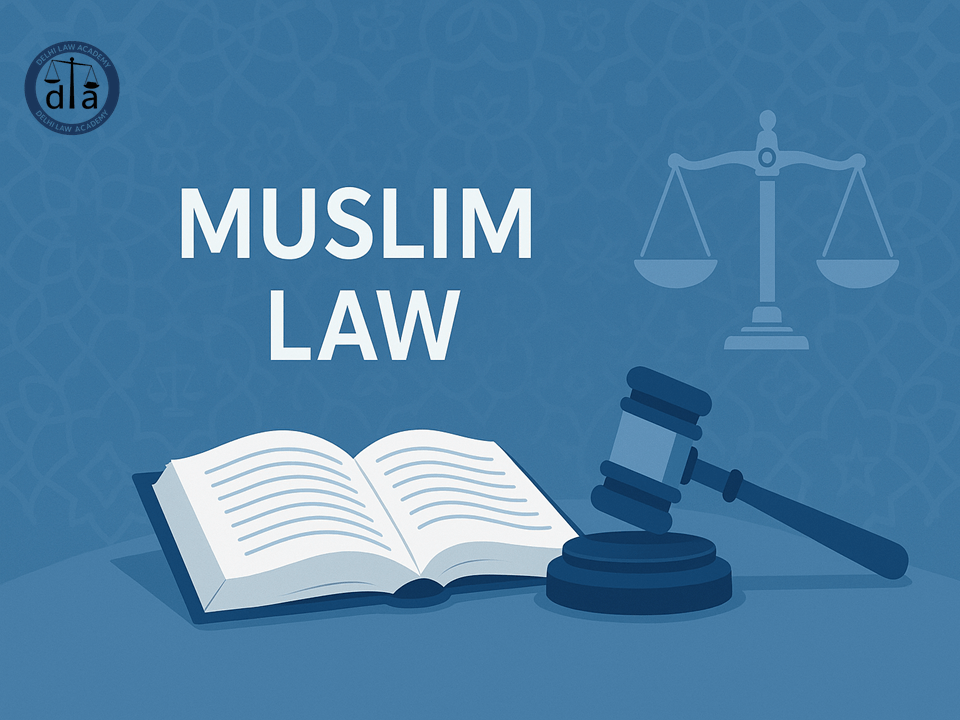
📚 Case: Hayatuddin v. Abdul Gani [1976 Bom]
- A valid gift may be made of an undivided share (mushaa) in property which is not capable of partition.
- A gift of an undivided share (mushaa) in property which is capable of division is irregular (fasid) but not void (batil).
- A gift of immovable property which is in the occupation of tenants may be completed by a request by the donor to the tenants to attorn to the donee.
Muslim Law is an important component of most Judicial Service exams in the country. Its thorough knowledge is a must for all aspirants of RJS, DJS, PCS (J) and other Judicial Service exams. To help such aspirants, Delhi Law Academy Jaipur has launched a series of study material modules on all important aspects of this vital part of their syllabus:
🧾 Judgment Summary: Hayatuddin v. Abdul Gani [1976 Bom]
This is a plaintiff’s appeal challenging the dismissal of his suit for a declaration and injunction that he was lawfully in possession of house property in suit in pursuance of a gift deed dated 10-6-1952 executed in his favour by one Rashidbi and Amnabi.
It is necessary to decide in this case whether the gift is to operate with regard to the 7/8ths interest of Amnabi and Rashidbi, and when in lieu of the interest certain house property has been allotted to the plaintiff in the earlier suit, the plaintiff was entitled to a declaration of ownership in respect of the property which was already in his possession.
It is not disputed that there can be a gift of an undivided share under Mohamadan Law. It will not be correct to say that this is not the claim of the plaintiff. In the earlier suit the plaintiff had no doubt claimed primarily a relief of declaration that the present plaintiff was the owner of the suit property but there was also a claim for an alternative relief of partition and separate possession in the earlier suit itself.
The alternative claim could not have been made except on the hypothesis that they had an undivided interest which they wanted to be separated and placed in possession of. It is this alternative prayer which has been granted in the earlier suit. The argument therefore, that at no stage was any claim made that an undivided interest was being transferred cannot be sustained.
Even in the present suit the plaintiff’s case is that he was the donee of 7/8th interest of Rashidbi and Amnabi and that the house property which is mentioned in the gift deed formed 7/8th interest; it is that of which he is in possession, and that possession is under the gift deed, now and, therefore, he was entitled to peaceful possession and enjoyment of that property.
The law relating to the gift of undivided property under Mohammedan Law is put in two parts in paragraphs 159 and 160 of the Principles of Mahammedan Law by Mulla. It is stated:
159. Gift of mushaa where property indivisible: A valid gift may be made of an undivided share (mushaa) in property which is not capable of partition.
160. Gift of mushaa where property divisible: A gift of an undivided share (mushaa) in property which is capable of division is irregular (fasid) but not void (batil). The gift being irregular, and not void, it may be perfected and rendered valid by subsequent partition and delivery to the donee of the share given to him. If possession is once taken the gift is validated.
How delivery of possession of immovable property can be given is explained in paragraph 152. It contemplates three kinds of cases:
- Where donor is in possession
- Where property is in the occupation of tenants
- Where donor and donee both reside in the property
There is evidence in this case to show that part of the property was in the occupation of tenants and plaintiff Hayatuddin was already residing in a part of the property.
A gift of immovable property which is in the occupation of tenants may be completed by a request by the donor to the tenants to attorn to the donee; and where the donor and the donees both reside in the property, no physical departure or formal entry is necessary in the case of a gift of immovable property in which the donor and the donee are both residing at the time of the gift. In such a case, according to Mulla, the gift may be completed by some overt act by the donor indicating a clear intention on his part to transfer possession and to divest himself of all control over the subject of the gift.
We have in this case three documents Exts. P-1, P-2 and P-3 which indicate the steps taken by the two donors to divest themselves of this property after they had made a gift in favour of Hayatuddin.
The declaration in the gift deed that possession was handed over to the donee and the intimations given to the tenants orally and subsequently by notices through counsel were sufficient evidence to show that the donors have done everything that was possible in the circumstances to hand over possession of the premises which they wanted to gift to the present plaintiff.
In addition to this there is their conduct in joining with Hayatuddin as co-plaintiffs to have their share separated and delivered possession of. This conduct also shows that the donors had done everything possible to make the gift effective and to divest themselves of possession and to transfer to Hayatuddin said possession of the undivided portion of the property as the donors themselves had.
In view of the speaking conduct of the donors it is difficult to hold in this case that possession of undivided share of the donors was not transferred by them to the present plaintiff.
* * * * *
📚 Continue Your Muslim Law Preparation
Don’t stop here! Strengthen your knowledge of Muslim Law with our blogs:
📘 Free Study Material for Judiciary Aspirants!
Download our FREE study material prepared by Delhi Law Academy’s expert faculty.
💬 Frequently Asked Questions on Muslim Law of Gifts (Hiba)
The Bombay High Court held that a valid gift may be made of an undivided share (mushaa) in property which is not capable of partition, and even if the property is divisible, such a gift is irregular (fasid) but not void (batil). Once possession is taken, the gift becomes valid.
Yes. Under Muslim Law, if the property is in possession of tenants, the gift may be completed by the donor requesting tenants to attorn to the donee. Physical delivery is not required if symbolic or constructive delivery is proved.
“Mushaa” refers to an undivided share in joint property. A gift of mushaa is valid if the property is indivisible, and irregular but not void if it can be divided. The irregularity is cured once possession is taken or partitioned.
The essentials are: (1) Declaration of gift (Ijab) by the donor, (2) Acceptance (Qabul) by the donee or their guardian, and (3) Delivery of possession (Qabza). All three must coexist for a valid Hiba.
No. Registration of a gift deed alone does not make a gift valid under Muslim Law. Delivery of possession (actual or constructive) is the most essential condition for a valid transfer of ownership.
This case clarifies the difference between valid, irregular, and void gifts under Muslim Law — a common topic in questions on Hiba in RJS, DJS, and PCS(J) examinations. Understanding this helps in framing precise answers in law papers.
Contact us
📍 Delhi Law Academy – Jaipur Branch
6C, Tower 2, Coaching Hub, Pratap Nagar, Jaipur – 302033
📞 Phone:
+91 9911916552
+91 8447285606
✉️ Email:
contactus@delhilawacademy.com

